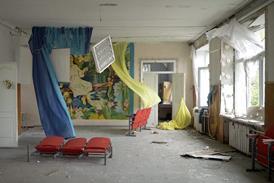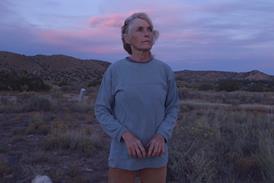Following the global success of March Of The Penguins, animal films are the hot new genre. But is there a market for theatrical wildlife documentaries' Melanie Rodier reports.
From meerkats to elephants, turtles to polar bears: in the post March Of The Penguins marketplace, a host of animal-based nature documentaries are trying to recreate the magic of a film that grossed $77m in the US and picked up the best documentary Oscar in 2006.
And the theatrical wildlife documentary boom shows no sign of slowing. Even with a range of major features in the works (see sidebar, right) Cannes this year demonstrated that distributors are still hungry for new projects.
ContentFilm International closed a raft of deals on new project Elephants Of The Okavango, about a family of African elephants crossing the desert to reach the wetlands of the Okavango Delta. Meanwhile, distributors on the Croisette also circled Nick Stringer's UK documentary The Turtle's Song, about a loggerhead turtle and her journey from a beach in Florida.
Penguins may have uncovered a potentially huge market for ambitiously mounted wildlife pictures, but it remains to be seen whether that success can be emulated by a pack of documentaries. Sophokles Tasioulis, one of the producers of Earth, a forthcoming feature version of hit BBC series Planet Earth, believes the trend will continue but could edge towards smaller films.
'There's room for two or three natural history movies a year, not 10 or 12. It's important not to damage the market by doing a project that isn't right for cinema. If we have one viewer saying, 'Could we have watched that on TV'', we've failed.'
He suggests one of the reasons behind the growing interest in theatrical wildlife projects is an ageing cinema-going demographic. 'The over-50s don't go to the cinema to see Spider-Man,' he says. 'But they're used to going to the cinema. They have time and money to experience something new and fun.'
The development of hi-tech cameras and advances in exhibition, particularly 3D, have also increased theatrical interest.
ThinkFilm's Mark Urman, the US distributor of The Story Of The Weeping Camel insists that nature films only work theatrically if the story is right. 'It's not about finding cute creatures on four legs,' he says.
Joe Oppenheimer, producer of BBC Films' Weinstein-backed The Meerkats says: 'Natural history documentaries are about the richness of photography and the immersion in another world.' The cinema, with its big screen and dark room, 'feels like their natural home'.
This migration to cinema means broadcasters such as the BBC - internationally recognised for its TV work in the area - are now looking at the synergy between television and theatre. Inspired by the success of March Of The Penguins, BBC Films conceived The Meerkats as a theatrical project, and plans to subsequently release it as a TV series (see case study, right).
Meanwhile, the BBC feature Earth shares some footage with the broadcaster's series Planet Earth, which has already been shown on TV in various territories, including the US. While the TV series is made up of 11 one-hour information-driven episodes, the film focuses solely on three characters. The combined budget of the film and TV series is $47m, with $15m for the feature.
Tasioulis points out that a related TV series can make it easier to attract backers to a costly nature documentary feature. 'We needed the TV series to be greenlit first before we seriously started thinking of raising money for the movie,' Tasioulis says. 'Without the series the movie would not have existed, and without the movie the series would not have looked as spectacular. It's a symbiotic relationship.'
Berlin-based Greenlight Media, which co-produced Earth and is handling all rights, is co-ordinating sales with BBC Worldwide, both to respect the broadcaster's existing relationships on the TV side and to co-ordinate theatrical and TV windows. In Spain, for example, the series will be shown on pay-TV, then the film will be released on DVD, and finally on free-TV. In France, the feature will first be released theatrically and then shown on TV. The movie will roll out theatrically in France, Germany, Spain, Switzerland and Greece in October, and in early 2008 in Japan.
'We see the TV series as an 11-hour promo for the movie,' Tasioulis says, pointing out that the series was fact-based and the feature is driven by character. 'Nobody buys cinema tickets to learn.'
The long migration
Potential revenues from TV sales and theatrical release can be great, but the journey to the screen is often an arduous one. Film-makers agree there is a lot at stake when making a nature documentary. M took five years to make, and Luc Jacquet spent 13 months in the North Pole filming March Of The Penguins.
'The most inspiring moment was when we knew we had the material after 13 months,' admits Emmanuel Priou, one of the three producers of March Of The Penguins along with Christophe Lioud and Yves Darondeau.
Tasioulis adds: 'Half our budget (for Earth) went on failure, but we'd factored that in. It's quite normal in natural history. You send a crew out and they return after a few weeks or months empty-handed, since they did not get the behaviour we wanted to film. You cannot do a nature documentary for cinema in three months. If you want killer shots, you must be prepared to spend a long time there.'
Producers across the board agree the main thing driving them on while shooting in extreme locations - and the ultimate success behind nature documentaries as with any dramatic feature - is the story.
'We were never crazy about animals but Luc Jacquet had everything inside him when he pitched us his project,' says Bonne Pioche's Christophe Lioud. 'The project had all the things we were looking for - challenge, potential of story, and a fantastic director.'
But the expense and logistical difficulties can make the financing of a nature documentary difficult. 'I believe that unless you're a well-established nature film director/producer, it is still very difficult to finance nature documentaries,' says Linda Saetre, who oversees business development at Bonne Pioche's New York office.





















No comments yet